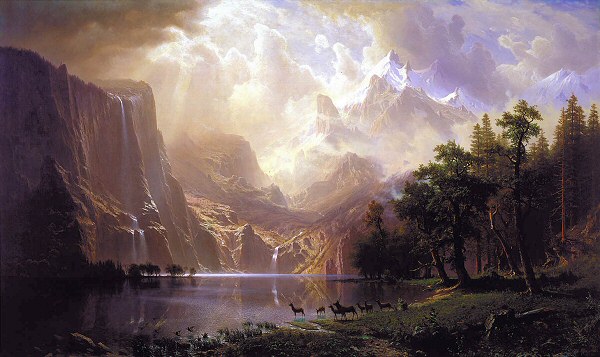 |
| Giant Redwood Trees of California by Albert Bierstadt |
There are a couple more pieces of music by Wolfgang Amadeus Mozart that I would like to feature before we move on. One is the overture from the opera The Marriage of Figero called Le Nozze di Figaro. I hope you enjoy this lovely piece of music. Mozart - Marriage of Figaro - Overture.
James Whitcomb Riley was sometimes called the children's poet. Here are two links to biographical sketches. The first is also a good source of his wonderful poetry.
James Whitcomb Riley Com
A Short Biography of America's Children's Poet
Today's poem - The Raggedy Man
O The Raggedy Man! He works fer Pa;
An' he's the goodest man ever you saw!
He comes to our house every day,
An' waters the horses, an' feeds 'em hay;
An' he opens the shed - an' we all ist laugh
When he drives out our little old wobble-ly calf;
An' nen - ef our hired girl says he can -
He milks the cow fer 'Lizabuth Ann. -
Ain't he a' awful good Raggedy Man?
Raggedy! Raggedy! Raggedy Man!
W'y, the Raggedy Man -he's ist so good,
He splits the kindlin'4 an' chops the wood;
An' nen he spades in our garden, too,
An' does most things 'at boys can't do. -
He clumbed clean up in our big tree
An' shooked a' apple6 down fer me -
An' 'nother 'n' too, fer 'Lizabuth Ann -
An' 'nuther 'n' too, fer The Raggedy Man. -
Ain't he a' awful kind Raggedy Man?
Raggedy! Raggedy! Raggedy Man!
An' The Raggedy Man one time say he,
Pick' roast' rambos from a' orchurd-tree,
An' et 'em - all ist roast' an hot! -
An' it's so, too! - 'cause a corn-crib got
Afire one time an' all burn' down
On "The Smoot Farm," 'bout four mile from town -
On "The Smoot Farm"! Yes - an' the hired han'
'At worked there nen 'uz The Raggedy Man! -
Ain't he the beatin'est Raggedy Man?
Raggedy! Raggedy! Raggedy Man!
The Raggedy Man's so good an' kind
He'll be our "horsey," an "haw" an' mind
Ever'thing 'at you make him do -
An' won't run off - 'less you want him to!
I drived him wunst way down our lane
An' he got skeered, when it 'menced to rain,
An' ist rared up an' squealed and run
Purt' nigh away! - an' it's all in fun!
Nene he skeered ag'in at a' old tin can...
Whoa! y' old runaway Raggedy Man!
Raggedy! Raggedy! Raggedy Man!
An' The Raggedy Man, he knows most rhymes,
An' tells 'em, ef I be good, sometimes:
Knows 'bout Giunts, an' Griffuns, an' Elves,
An' the Squidgicum-Squees 'at swallers the'rselves:
An', rite by the pump in our pasture-lot,
He showed me the hole 'at the Wunks is got,
'At lives 'way deep in the ground, an' can
Turn into me, er 'Lizabeth Ann!
Er Ma, er Pa, er The Raggedy Man!
Ain't he a funny old Raggedy Man?
Raggedy! Raggedy! Raggedy Man!
An' wunst, when The Raggedy Man come late,
An' pigs ist root' thru the garden-gate,
He 'tend like the pigs 'uz bears an' said,
"Old Bear-shooter'll shoot 'em dead!"
An' race' an' chase' 'em, an' they'd ist run
When he pint his hoe at 'em like it's a gun
An' go "Bang!-Bang!" nen 'tend he stan'
An' load up his gun ag'in! Raggedy Man!
He's an old Bear-Shooter Raggedy Man!
Raggedy! Raggedy! Raggedy Man!
An' sometimes The Raggedy Man lets on
We're little prince-children, an' old King's gone
To git more money, an' lef' us there -
And Robbers is ist thick ever'where:
An' nen - ef we all won't cry, fer shore -
The Raggedy Man he'll come and "splore
The Castul-Halls," an' steal the "gold" -
An' steal us, too, an' grab an' hold
An' pack us off to his old "Cave"! - An'
Haymow's the "cave" o' The Raggedy Man! -
Raggedy! Raggedy! Raggedy Man!
The Raggedy Man - one time, when he
Wuz makin' a little bow-'n'-orry fer me,
Says "When you're big like your Pa is,
Air you go' to keep a fine store like his -
An' be a rich merchunt - an' wear fine clothes? -
Er what air you go' to be, goodness knows?"
An' nen he laughed at 'Lizabuth Ann,
An' I says "'M go' to be a nice Raggedy Man!"
I'm ist go' to be a nice Raggedy Man!
Raggedy! Raggedy! Raggedy Man!





